How Long Should You Wait to Get a New Dog After You’ve Lost One?
Adjusting to life after your pet has passed away is tough. Here, three grief counselors help pet parents navigate grief and find their way toward loving a new pup.
Adjusting to life after your pet has passed away is tough. Here, three grief counselors help pet parents navigate grief and find their way toward loving a new pup.
by Janelle Leeson, | March 24, 2025

Raul Navarro / Stocksy
Losing a pet is one of the hardest parts of being a pet parent, and deciding when (or if) you’re ready to bring a new one into your life can be just as hard. Some pet parents experience anticipatory grief long before their pet passes. Others aren’t sure how or when to move forward once their pet is gone.
That’s the thing about grief: There’s no set timeline or “right” way to handle it, says Grant Hazell, a counselor and pet-loss grief specialist. But getting to know your grief — making room for it, sitting in it, and processing it — can help you figure out when it feels right to welcome a new dog after losing one. Here’s what the experts suggest about taking that next step.
Losing a pet is so painful because they’re often the ones who helped us get through tough times. When they’re gone, it can feel like this huge hole opens up, leaving you unsure of where to turn for support. It doesn’t help that society won’t always understand or acknowledge that pain, says Dr. Linda Harper, a clinical psychologist specializing in pet loss grief and offering support through her group, Wings.
Leigh Ann Gerk of Mourning to Light Pet Loss explains that losing a pet is a form of disenfranchised grief, which means it’s a type of grief that is often minimized or dismissed by most of society. This can make you feel even more lonely and isolated, like no one really understands. But trust me, we get it — and so do our experts.
Anyone who’s lost a pet will tell you that you feel the loss of a pet just as deeply, if not more so, than the loss of a human loved one. “Human-pet relationships are less complicated than human relationships. Love is unconditional. It’s a relationship based on mutual dependency — transparent and built on everything other than spoken words,” Hazell says.
Gerk says she’s often asked this very question by many of her clients, and each time she’s asked, she finds herself giving the same response: It depends. Some find comfort in bringing home a new companion right away, while others need months or even years before they’re ready.
Hazell often encourages grieving pet parents to visit shelters or consider fostering before adoption. “If it all feels right, then maybe you’re ready to be a pet parent once again,” he says. If you’re new to fostering and unsure where to start, take a look at our guide about the key questions to ask before diving in.
However, feeling ready doesn’t necessarily mean you’ve completely moved on. “Grief from loss tends to come in waves,” Dr. Harper says. Rather than wait for every bit of sadness to disappear, Gerk suggests asking yourself this: Have I processed my grief enough that the idea of a new companion brings me more excitement than heartache?
Everyone grieves differently, but these signs might indicate you’re ready for a new dog.
Grief doesn’t follow a neat, linear path. But if we were to map it out, Hazell says it might look something like this:
Shock, disbelief, and denial
Anger, alienation, and distancing
Guilt
Depression
Resolution and/or integration
“These stages aren’t rigid,” he explains. “They serve as a roadmap of what might come.” The middle steps may cycle for a while or not come at all. But in time, the weight of loss won’t feel quite so heavy. “Grief doesn’t have a finish line, but there will come a time when a memory brings more smiles than tears,” Gerk says.
Hazell can’t stress enough how important it is to ease into the idea of a new pet before committing to adoption. You don’t have to foster, he says — spending time with a friend’s pet can help gauge those gut feelings. Do you feel joy and excitement, or does it bring an overwhelming wave of sadness?
Grief can be rough, and while some people find their purpose in caring for a new pet, others might struggle with the responsibility. If the idea of daily walks, feeding schedules, and vet visits feels totally overwhelming, that’s OK. It just might mean you need more time. But if you’re starting to feel excited about the idea of having a pet to care for, that’s a good sign you’re ready to take the next step.
If you’re struggling with guilt or feeling like you’re betraying your late pet, you’re not alone. Many pet parents wrestle with these emotions. Gerk suggests asking yourself this: What would my pet want me to do? “The response is usually that their pet would want them to be happy and to help a fellow friend in need,” she says.
In her therapy practice, Dr. Harper reminds pet parents that bittersweet emotions are normal. You might smile while playing tug-of-war with your new pup, only to tear up when they remind you of your late pet. And that’s OK. The goal isn’t to replace your old pet but to build a new, unique bond. Hazell says all of these feelings — different, more, or even less love — should be anticipated and considered natural and valid, as long as you’re open to loving a new pet for who they are, rather than expecting them to be just like the one you lost.
If your grief ever feels like too much to handle, don’t hesitate to reach out to a pet grief counselor. Professionals like Dr. Harper, Hazell, and Gerk are there to help. There are also lots of pet-loss grief support groups popping up, too, including virtual ones led by our experts. You can likewise look for a local group that feels right for you.
The first step in healing — so that you can eventually welcome a new dog — is focusing on what brings you comfort, whether it’s taking time off work, leaning into relationships that make you feel good, or getting out into nature. Our experts also recommend journaling, planting something in your pet’s honor, or simply changing up your routine. Basically, there’s no wrong way to grieve.
Some people might even find it helpful to scream or silent-scream to release pain. If you’re struggling to part with your late pet’s belongings — such as their bed, food bowls, or toys — there’s no rush, Gerk says. Leave them be. You might even want to leave their nose mark on your car window, or skip vacuuming. Until you feel ready, there’s no timeline or right moment to get a new dog.
“No, you are not a bad person,” Gerk assures. Sure, it’s tough not to compare your new dog to your old one, but it’s super important to try to let go of those comparisons. Like when your new pup does something naughty, this can stir up some resentment if your old dog didn’t act out in this way. But think back to when you first got your old pet — there were probably some tough times then, too. “It’s a big change to welcome a new pet into your home, but give yourself some time to adjust. In time, you’ll be more willing to embrace this new relationship and look forward to the memories you’ll make,” Gerk says.
Hazell always says, “We never, ever replace.” That said, you might look back at your old dog and think about the things you loved most about them. Maybe you want a dog who has some of the same qualities, or maybe you want a pup who is totally different. A lot of people fall in love with a particular breed and decide they only want that breed from then on. Just remember: Try not to compare your new dog to the old one. Each pet has a unique personality, and no two relationships will ever be the same.
If you’re feeling ready for a new companion, think about which qualities and traits would best fit your lifestyle. Then, check out Adopt a Pet’s adoptable pet database to find adoptable dogs near you.
The decision on how long you should wait to get a new dog after one dies is yours and yours alone. Some people get a new pet almost immediately, while others wait months or even years. Some choose to focus on fostering first. No matter what you choose, Dr. Harper has one important piece of advice: “Please don’t let anyone tell you there’s a set amount of time you need to wait.”
It is totally normal to feel guilty about getting a new dog after losing one. “It’s normal to feel like you’re moving on or replacing your pet. But remember, you don’t replace relationships. You create new ones,” Gerk says. You can still love your first pet while loving your second, and that love might even look and feel different.
Yes, it can be healthy to get another dog after losing one. As Dr. Harper says, love heals love. “This could be through another pet, or it could be through self-love,” she says.
Successor dog syndrome occurs when you start comparing your new dog to your old one, which can unfairly lead you to feel like the new dog will never measure up to the one you lost.
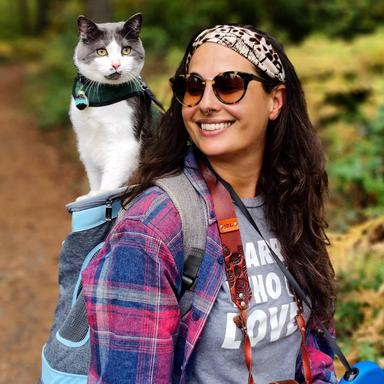
Janelle Leeson is a Portland, Oregon-based freelance writer. Her work has been featured in magazines such as Inside Your Dog’s Mind, Inside Your Cat’s Mind, and Paw Print, as well online at Insider Reviews, NBC Select, Shop Today, PetMD, and Daily Paws. She has two adventure cats, a flock of urban chickens, and a soon-to-be-husband who doesn’t mind housing the occasional foster cat — or five.
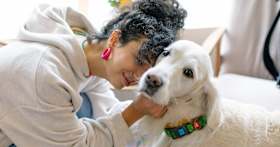
Adoption Advice

Adoption Advice
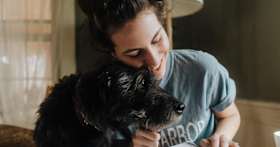
Adoption Advice

Adoption Advice
Lower healthcare costs, unique looks, adorable personalities — there are several reasons to rescue a mixed-breed dog. Here’s why you’ll fall in love with them.
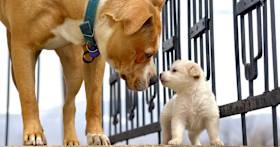
Adoption Advice
Adopting a new puppy can shake-up the doggy dynamics at home. Here’s how to keep the peace and harmony among your pets.

Behavior & Training
Yes, your dog peeing themselves can be frustrating, but they’re not doing this intentionally. Here’s what urinary incontinence may indicate — and what you should do.

Pet Wellness
If you suspect your pup may have fleas — don’t panic. Here’s how to check for them, treat them, and eliminate them.
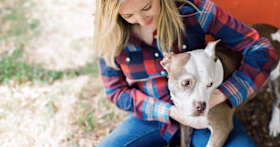
Pet Wellness
Hyperthyroidism isn’t a dealbreaker. Learn what it takes to care for a dog with hyperthyroidism.

Pet Wellness
Does your dog have the itch? It could be this common, treatable skin condition. Here’s everything you need to know about the Ringworm.